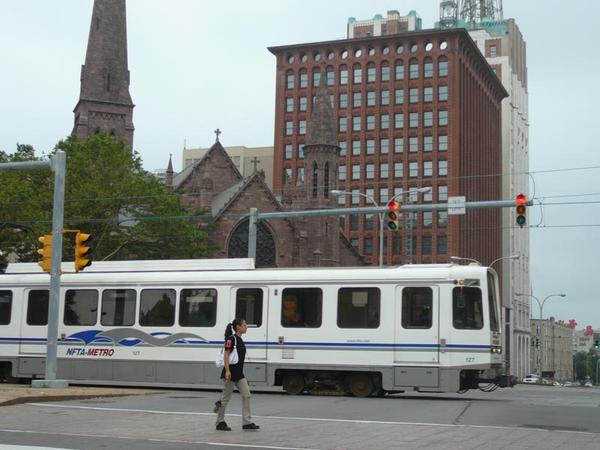Many Jacksonvillians still believe that Jacksonville is too small and not dense enough for rail. Here is a list of American cities and their rail systems that will put this inaccurate argument to rest.

Fort Collins Municipal Railway image: http://www.fortnet.org/trolley/
United States Metropolitan Areas with rail systems, yet smaller than Jacksonville
MSA 2008 population estimate - MSA core city name
1,313,228 Jacksonville
1,285,732 Memphis*
1,134,029 New Orleans*
1,124,309 Buffalo**
1,115,692 Salt Lake City** ***
1,012,018 Tucson*
895,030 Bridgeport-Stamford***
846,101 New Haven***
845,913 Albuquerque***
797,740 Oxnard***
783,806 Worcester***
675,069 Little Rock*
531,488 Ogden***
334,353 Savannah*
292,825 Fort Collins, CO*
290,977 Fort Smith, AR*
270,681 Atlantic City***
264,519 Norwich/New London***
143,937 Santa Fe***
* - Streetcar
** - Light Rail
*** - Commuter Rail
**** - Heavy Rail
link: http://www.census.gov/popest/metro/CBSA-est2008-annual.html
United States Urban Areas with rail, slightly larger than Jacksonville
Urban area population - Urban area core city name
976,703 Buffalo**
972,091 Memphis*
901,920 Austin***
888,890 Bridgeport-Stamford*** (Shore Line East commuter rail)
887,650 Salt Lake City** ***
882,295 Jacksonville
* - Streetcar
** - Light Rail
*** - Commuter Rail
**** - Heavy Rail
Buffalo NFTA-METRO Metrorail image by MetroJacksonville.com
United States Urban Areas with rail systems, yet smaller than Jacksonville
Urban area population - Urban area core city name
882,295 Jacksonville
758,927 Charlotte* **
749,935 Nashville***
720,425 Tucson* (streetcar operates on weekends only)
598,191 Albuquerque***
533,015 Mission Viejo*** (LA Metrolink commuter Rail)
531,314 New Haven***
429,882 Worcester*** (Boston MBTA commuter rail)
417,933 Ogden*** (Salt Lake City Front Runner commuter rail)
360,331 Little Rock*
337,591 Oxnard*** (LA Metrolink commuter rail)
268,472 Trenton***
227,180 Atlantic City*** (New Jersey Transit)
210,990 Thousand Oaks, CA*** (LA Metrolink commuter rail)
208,886 Savannah*
206,757 Fort Collins, CO* (volunteer streetcar operates May through September only)
189,026 Waterbury, CT*** (Metro-North Railroad commuter rail terminus)
173,160 Norwich/New London, CT*** (Shore Line East commuter rail)
110,942 Kenosha*
106,470 Fort Smith, AR*
80,337 Santa Fe, NM***
54,770 Galveston, TX*
* - Streetcar
** - Light Rail
*** - Commuter Rail
**** - Heavy Rail
link: http://en.wikipedia.org/wiki/List_of_United_States_urban_areas

Kenosha PCC streetcar image: http://en.wikipedia.org/wiki/Kenosha_Electric_Railway
United States Urban Areas with rail systems despite having a lower population density than Jacksonville
Urban area population/square mile - Urban area core city name
2,149.2 Jacksonville
2,056.7 Pittsburgh**
2,040.1 Savannah*
1,931.2 Waterbury***
1,925.5 Fort Smith*
1,910.3 Bridgeport-Stamford***
1,879.7 Atlantic City
1,862.2 New Haven***
1,783.3 Atlanta****
1,752.8 Little Rock*
1,745.0 Charlotte* **
1,740.9 Nashville***
1,717.3 Worcester***
1,407.4 Norwich/New London***
* - Streetcar
** - Light Rail
*** - Commuter Rail
**** - Heavy Rail
link: http://en.wikipedia.org/wiki/List_of_United_States_urban_areas

The T (Pittsburgh light rail) image: http://en.wikipedia.org/wiki/File:Pittsburgh_lrt.jpg
2008 Daily Ridership Numbers for rail systems mentioned in the host cities above
Riders/Day - System name - First year of operation - Host city - Length and type of rail
269,700 MARTA (1979) - Atlanta (47.6 heavy rail system)
44,800 UTA TRAX (1999) - Salt Lake City (19 mile light rail system)
26,300 Buffalo Metro Rail (1984) - Buffalo (6.4 mile light rail system)
25,700 The T (1897) - Pittsburgh (25 mile light rail system)
21,700 LYNX Rapid Transit Services (2007) - Charlotte (9.6 mile light rail system)
15,100 Streetcars in New Orleans (1835) - New Orleans (21.5 mile streetcar system)
7,900 New Jersey RiverLine (2004) - Trenton/Camden (34 mile DMU commuter rail system)
5,800 UTA FrontRunner (2008) - Salt Lake City (44 mile commuter rail system)
3,200 Tacoma Link (2003) - Tacoma (1.6 modern streetcar line)
2,800 Memphis RTA Trolley (1993) - Memphis (6.7 mile streetcar system)
2,500 New Mexico Rail Runner (2006) - Alburquerque (97 mile commuter rail system)
2,100 Shore Line East (1990) - New Haven (commuter rail system)
1,700 JTA Skyway (2000) - Jacksonville (2.5 mile people mover system)
900 Music City Star (2006) - Nashville (32 mile commuter rail system)
340 River Rail Streetcar (2004) - Little Rock (2.5 mile streetcar system)
200 Kenosha Transit (2000) - Kenosha (2 mile streetcar system)
0 Galveston Island Trolley (1988) - Galveston (5.2 miles)***
***- Galveston Island Trolley currently shut down due to damage from Hurricane Ike.
wikipedia.org/wiki/List_of_North_American_rapid_transit_systems_by_ridership
wikipedia.org/wiki/List_of_United_States_commuter_rail_systems_by_ridership
wikipedia.org/wiki/List_of_United_States_light_rail_systems_by_ridership

New Jersey Transit RiverLine DMU commuter rail image: http://en.wikipedia.org/wiki/River_Line_(New_Jersey_Transit)
What does this mean for Jacksonville
Take a ride through Downtown Memphis on the MATA Trolley
While this list could suggest that Jacksonville may suffer from an inferiority complex, it does show that our community is not too small for immediate rail investment. The vast difference in ridership numbers also suggest some cities have had more success than others at implementing rail. Instead of turning a blind eye and ignoring the data, we should look at our peer communities' systems as good and bad examples of how to properly implement rail transit locally.
Article by Ennis Davis


29 Comments so far
Jump into the conversation